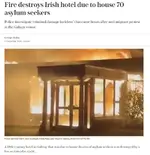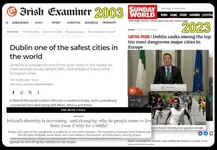First ever Sinn Féin nationalist first minister sworn in in Northern Ireland
Probably this means Ireland is now more likely to be reunited, no more English presence.
I can't believe how passionate the Irish on both sides of that debate are, the republicans / nationalists to see it reunited and the few unionists in Northern Ireland who so passionately want to stay part of the United Kingdom under His Majesty King Charles III. There's even a high wall in Belfast with a massive net on top of it to stop them throwing bombs at each other.
You are so wrong in so many parts of your comment that I don't know where to start.
Ireland will never be reunited, for several reasons:
1: The republic of Ireland can't afford the additional territory, nor the cost of taking over all those public services, not without having to stop taking Africans in to their country.
2: The majority of Northern Irish residents, despite their political leanings wish to remain part of the united kingdom, every poll supports this.
3: Some polls suggest that some of the border counties of the Republic of Ireland would welcome a border poll, if they had the option to rejoin their historic homeland in Northern Ireland (that generally depends on the relative financial benefits of either side).
4: Historically, the only time the island of Ireland has been united is under British rule. The British don't have the balls to do that again.
5: The English don't have "a presence" in Ireland, some live there, some work there, some holiday there, just like the Irish in England, or any other resident of the "common travel area" of the British Isles.
6: The only passionate people on the issue are politicians, and they are just shouting soundbites. Sinn Fein (with support) had the votes in both the southern and northern Irish parliaments to force a vote on this, but didn't. Because they knew they would lose and even if they won, one of their major reasons for existing would disappear.
7: Those walls? You can just walk around the side of them, they are tourist destinations. Northern Ireland had and still has the lowest crime rate in the UK, even during the worst of "the Troubles".
Also, you mention the "few unionists"? To quickly break it down, you can split Northern Ireland into 3 main parts and 3 sub/small parts.
The 3 main parts are Unionist, Nationalist and Northern Irish. The unionists want to remain British via the ballot box, the nationalists want to be Irish via the ballot box (but sometimes like being in a British Northern Ireland, depending on the economy), the northern Irish, dont consider themselves to be subordinate to either Ireland or Great Britain, but would generally prefer to be part of the UK. The subfactions are the loyalists and republicans and others. Loyalists and republicans are tiny minorities of the unionists and nationalists who use violence to further their aims. The don't really do terrorism anymore, but still continue to peddle drugs, run whores and run protection rackets. They are very well organised organised crime gangs. Finally the others, these are immigrants and others who don't really have a say in the wider political landscape of Irish reunification.
To muddy the water even more: Northern Ireland is split religiously into 45% protestant, 45% catholic and 10% other. You might imagine all of the Catholics would be pro Irish reunification? Wrong, the country is split 65-70% British to 30-35% Irish leaning.
Not that any of that matters, because if you are born in Northern Ireland you are a dual citizen of both Ireland and the United Kingdom by default, and just like anyone else in the UK or Ireland, you can live, work, study anywhere there on either passport. So, Irish reunification isn't really a thing anymore, what's the point of being a little bit poorer and having even worse public services, when you can be a citizen of that country anyway without the financial disincentives?





